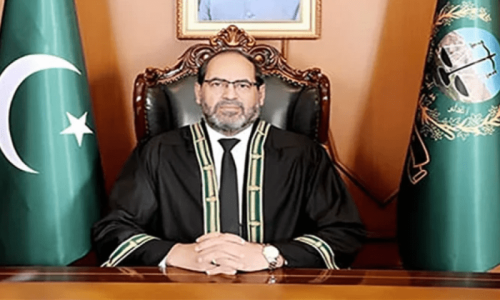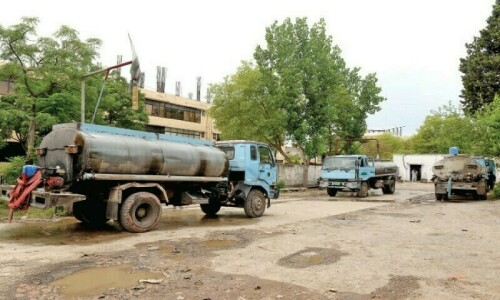
KARACHI: The Sindh cabinet on Tuesday decided to invest $25 million to “revegetate” the degraded wetlands to provide full spectrum of wetland ecosystem services for the benefit of poverty-stricken coastal communities through public-private partnership (PPP).
The meeting was chaired by Chief Minister Syed Murad Ali Shah and all provincial ministers, advisers, acting chief secretary and other senior officials attended.
Information Minister Saeed Ghani and Local Government Minister Nasir Shah later briefed the media about the decisions taken by the cabinet.
During the meeting, Minister Shah, who also holds the portfolio of forest and wildlife, informed the cabinet that blue carbon was the carbon stored and sequestered in costal ecosystem such as mangrove forests, sea grass meadows, intertidal salt-marshes or wetlands.
These valuable ecosystems hold vast carbon reservoir. They sequester atmospheric CO2 through primary production and then deposit it in their sediment, he said, adding that blue carbon was found in the soils or sediments beneath the vegetation.
CM says the govt allowed trophy hunting not to generate revenue but to manage, conserve and protect wildlife
He said those degraded wetlands if properly revegetated had the potential to provide full-spectrum of wetlands ecosystem services.
Forest Secretary Rahim Soomro said the PPP mode was the only way forward for rehabilitation and restoring those vast chunks of degraded wetlands in the Indus Delta area.
The chief minister said budgetary and techno-managerial constraints in revegetation of those areas could be addressed through private sector’s involvement. He asked the forest department to start work through PPP mode.
Minister Shah said a private firm had already showed its interest. They had committed to develop and sustainably manage the wetlands in due recognition of their social, economic and ecologic significance, including carbon sequestration and storage.
The private firm, as the meeting was told, had proposed a Sindh Blue Carbon initiative (SCBI) that was to be implemented over 0.2 to 0.25 million hectares of Indus Delta land falling in Thatta, Sujawal and Badin districts.
The proposed project period was for 60 years which could be extendable up to 100 years. The project would cost around $25m.
Trophy hunting allowed
The cabinet also approved trophy hunting in the province.
The forest minister said trophy hunting was not carried out in the protected areas such as national parks and wildlife sanctuaries but it was allowed only at game reserves, private lands and state lands.
The chief minister said it was not an attempt to generate revenue but to manage, conserve and protect wildlife and their habitats.
The cabinet was informed that in early 1990s, community-based trophy hunting started in Balochistan and Gilgit-Baltistan which attracted international hunters to Pakistan.
The meeting was told in non-protected areas, the population of ibex had been counted at 797 at different areas, including Surjan/Duban, Sumbak Game Reserve, Eri Game, Hothiyano, Pachran and Uth Palan.
It was said five urial had been allowed for trophy at a fee of $14,000 each (only for foreigners), 20 Sindh ibex, including 15 by foreigners at a fee of $5,600 each and five ibex by Pakistani nationals at a fee of Rs300,000 each.
33 illegal jetties causing Rs4-5bn loss
Fisheries Minister Bari Pitafi told the cabinet there were 33 illegal jetties, including 12 in Ibrahim Hyderi, five at Mauripur, six at Thatta, Badin, Mirpur Sakro and Gharo and 10 at the coastal belt bordering Balochistan.
The jetties were being managed by influential people who were charging Rs100 to Rs5,000 from every boat. Thus they were causing loss of Rs4-5 billion to the government.
The chief minister asked the fisheries department to make necessary arrangements for installation of the Vessel Monitoring System (VMS) in phases.
A necessary amendment would be made to regularise the illegally developed jetties to ensure they were managed by the government.
Saeed Ghani, who also holds the portfolio of labour, presented the draft Sindh Occupational Safety & Health Rules, 2019 framed under the act of 2018.
The rules have 26 sections in which workers, labourers and agricultural workers have been included.
Employers have been bound to provide clean atmosphere in their establishments and provide safe and secured environment with measures, including installation of illumination, ventilation, maintenance of temperature, noise control and dust control, etc.
The cabinet approved the rules and directed the labour department to implement them in letter and spirit.
Minister Ghani requested the cabinet to exempt all shops and other such commercial establishments from the registration fee under the Ease of Doing Business Reforms.
The cabinet allowed exempting all those shops, etc, from registration fee all over Sindh. However, those shops would have to get registered through the business portal free of cost.
Sindh to approach Centre for PTDC assets
The cabinet observed that after the passage of the 18th Amendment assets of the Pakistan Tourism Development Corporation should have been devolved automatically.
The PTDC has an eight-kanal motel in a dilapidated condition at Hawkesbay, 32 acres of land at Sukkur, nine-kanal land at Hyderabad, tourism facilitation centre at Karachi, a motel at Moenjodaro, a tourism information centre at Thatta and six-kanal land at Bhambhore.
The cabinet decided to write a letter to the federal government to get those assets transferred to the provincial government and meanwhile maintenance of those assets should be looked after by the Sindh government.
The health department told the cabinet the regional blood centre at Jamshoro was being operated by the Indus Hospital by attaching seven blood banks, LUMS Hospital branch Hyderabad, DHQ Matiari, Civil Hospital Thatta, Civil Hospital Badin, Civil Hospital Mirpurkhas, Civil Hospital Tharparkar and Civil Hospital Jamshoro.
The Indus Hospital performed a gap analyses wherein it was found the total requirement of all the attached hospital-based blood banks was 70,000 bags, while just 20,000 bags were being financed according to the contract.
The increase in financing to meet the requirement would cause an impact of Rs8.2bn in the next 10 years. The cabinet approved the proposal.
Mr Ghani told the media that the cabinet asked all ministries to furnish details of vacancies in them with the CM House by Jan 15 for recruitments.
The CM also asked the LG minister to get the Shia Marriage and Meeras Bill vetted by the law department soon so that it could be passed by the assembly.
Published in Dawn, January 8th, 2020















































Dear visitor, the comments section is undergoing an overhaul and will return soon.